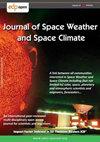Climatology and Modeling of Ionospheric Irregularities over Greenland Based on Empirical Orthogonal Function Method
IF 2.7
2区 物理与天体物理
Q2 ASTRONOMY & ASTROPHYSICS
引用次数: 4
Abstract
This paper addresses the long-term climatology (over two solar cycles) of total electron content (TEC) irregularities from a polar cap station (Thule) using rate of change of TEC index (ROTI). The climatology reveals various variabilities over different time scales, i.e., solar cycle, seasonal, and diurnal variations. These variations in different time scales can be explained by different drivers/contributors. The solar activity (represented by the solar radiation index F10.7P) dominates the longest time scale variations. The seasonal variations are controlled by the interplay of the energy input into the polar cap ionosphere and the solar illumination that damps the amplitude of ionospheric irregularities. The diurnal variations (with respect to local time) are controlled by the relative location of the station with respect to the auroral oval. We further decompose the climatology of ionospheric irregularities using the empirical orthogonal function (EOF) method. The first four EOFs could reflect the majority (99.49%) of the total data variability. By fitting the EOF coefficients using three geophysical proxies (namely, F10.7P, Bt and Dst), a climatological model of ionospheric irregularities is developed. The data-model comparison shows satisfactory results with high Pearson correlation coefficient and adequate errors. Additionally, we modeled the historical ROTI during the modern grand maximum dating back to 1965 and made the prediction during solar cycle 25. In such a way, we are able to directly compare the climatic variations of the ROTI activity across six solar cycles.基于经验正交函数法的格陵兰上空电离层不规则性的气候学和建模
本文利用总电子含量指数(ROTI)的变化率研究了极帽站(Thule)总电子含量(TEC)不规则性的长期气候学(两个太阳周期)。气候学在不同的时间尺度上表现出不同的变化,即太阳周期、季节和日变化。这些在不同时间尺度上的变化可以用不同的驱动因素/贡献者来解释。太阳活动(以太阳辐射指数F10.7P表示)主导了最长的时间尺度变化。季节变化是由输入到极冠电离层的能量和抑制电离层不规则幅度的太阳光照的相互作用控制的。日变化(相对于当地时间)是由观测站相对于极光椭圆的相对位置控制的。利用经验正交函数(EOF)方法进一步分解电离层不规则气候学。前四个EOFs可以反映大部分(99.49%)的总数据变异性。利用F10.7P、Bt和Dst三个地球物理指标拟合EOF系数,建立了电离层不规则性气候模型。数据模型比较结果令人满意,Pearson相关系数较高,误差较小。此外,我们模拟了1965年现代极大期的历史ROTI,并对第25太阳周期进行了预测。通过这种方式,我们可以直接比较六个太阳周期中ROTI活动的气候变化。
本文章由计算机程序翻译,如有差异,请以英文原文为准。
求助全文
约1分钟内获得全文
求助全文
来源期刊

Journal of Space Weather and Space Climate
ASTRONOMY & ASTROPHYSICS-GEOCHEMISTRY & GEOPHYSICS
CiteScore
6.90
自引率
6.10%
发文量
40
审稿时长
8 weeks
期刊介绍:
The Journal of Space Weather and Space Climate (SWSC) is an international multi-disciplinary and interdisciplinary peer-reviewed open access journal which publishes papers on all aspects of space weather and space climate from a broad range of scientific and technical fields including solar physics, space plasma physics, aeronomy, planetology, radio science, geophysics, biology, medicine, astronautics, aeronautics, electrical engineering, meteorology, climatology, mathematics, economy, informatics.
 求助内容:
求助内容: 应助结果提醒方式:
应助结果提醒方式:


